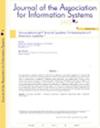缓解网络评分从众偏见的预警方法:理论分析与实验研究
IF 5.5
3区 管理学
Q1 COMPUTER SCIENCE, INFORMATION SYSTEMS
引用次数: 0
摘要
目前的在线评论系统普遍存在评级偏见。有偏见的评级可能导致违反客户信任和商业智能的失败。因此,从业人员和研究人员都在努力遏制评级偏见。在本文中,我们研究了从众偏见,即由于个人发布的评分向显示的平均评分转移而导致的扭曲,并提出了一种偏见警告方法来减轻这种偏见。借鉴柔性修正模型、行为经济学中的估值理论和前人的预警研究成果,分两步设计了有效的预警策略。首先,从前人研究广泛采用的风险预警策略入手,综合理论分析和实证证据,对其不足之处进行合理化分析。其次,考虑到这些不足,我们确定了一个补充的内容设计因子-排序任务,并构建了一个风险警报与排序任务的预警策略。然后,我们从经验上测试了两种警告策略对个人评分的影响,在这种情况下,从众偏见在个人的初始评估中要么发生,要么不发生。四个对照实验的结果表明:(1)风险预警策略可以减少个人评分中的从众偏见,但在个人初始评估中没有出现从众偏见时,会引起不必要的评分扭曲;(2)风险预警与排名任务策略可以减轻从众偏见,同时避免上述不必要的评分扭曲,因此可以作为一种有效的预警策略。我们的研究通过提出一种有效的消除bandwagonbias的解决方案和一种偏见警告方法来消除在线评级的偏见,这有助于增加在线平台上的评级信息。本文章由计算机程序翻译,如有差异,请以英文原文为准。
A Warning Approach to Mitigating Bandwagon Bias in Online Ratings: Theoretical Analysis and Experimental Investigations
Current online review systems widely suffer from rating biases. Biased ratings can lead to violations of customer trust and failures of business intelligence. Hence, both practitioners and researchers have directed massive efforts toward curbing rating biases. In this paper, we investigate bandwagon bias, the rating distortion resulting from individuals posting ratings shifted toward the displayed average rating, and propose a bias warning approach to mitigate this bias. Drawing on the flexible correction model, the theory of valuation in behavioral economics, and previous warning research, we design an effective warning strategy in two steps. First, we start with the risk-alert warning strategy, which prior research has widely employed, and rationalize its deficiencies by synthesizing theoretical analysis and extant empirical evidence. Second, considering the deficiencies, we identify a supplementary content design factor—the ranking task—and construct a risk-alert-with-ranking-task warning strategy. We then empirically test the effects of the two warning strategies on individual ratings in cases in which bandwagon bias either occurs or does not occur in individuals’ initial assessments. The results of four controlled experiments indicate that (1) the risk-alert strategy can reduce bandwagon bias in individual ratings but will elicit unwanted rating distortions when bandwagon bias does not occur in individuals’ initial assessments, and (2) the risk-alert-with-ranking-task strategy can mitigate bandwagon bias while avoiding the unwanted rating distortions above and can thus function as an effective warning strategy. Our research contributes to the literature by proposing an effective debiasing solution for bandwagon bias and a bias warning approach for online rating debiasing, which can help increase rating informativeness on online platforms.
求助全文
通过发布文献求助,成功后即可免费获取论文全文。
去求助
来源期刊

Journal of the Association for Information Systems
工程技术-计算机:信息系统
CiteScore
11.20
自引率
5.20%
发文量
33
审稿时长
>12 weeks
期刊介绍:
The Journal of the Association for Information Systems (JAIS), the flagship journal of the Association for Information Systems, publishes the highest quality scholarship in the field of information systems. It is inclusive in topics, level and unit of analysis, theory, method and philosophical and research approach, reflecting all aspects of Information Systems globally. The Journal promotes innovative, interesting and rigorously developed conceptual and empirical contributions and encourages theory based multi- or inter-disciplinary research.
 求助内容:
求助内容: 应助结果提醒方式:
应助结果提醒方式:


